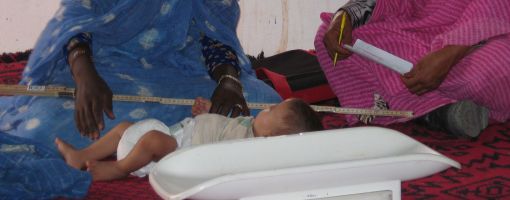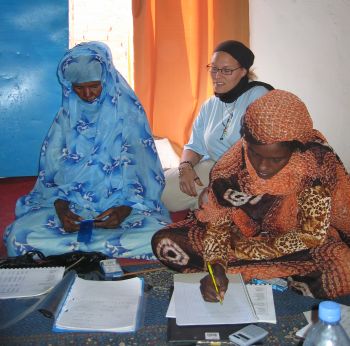
A Norwegian humanitarian organisation and a university college has cooperated on researching the nutrition levels of the Saharawi refugees. The cooperation has led to a series of publications. See the studies here.

The Saharawi refugees have for a number of years been living in a harsh humanitarian situation. It is near impossible to grow food in the desert landscape, and most refugees depend on foreign aid assistance. Hence, the nutrition situation is acute.
For over a decade, Norwegian Church Aid (NCA) and the University College of Oslo and Akershus (HIOA) have cooperated with Saharawi health authorities to map the nutrition situation in the camps. The work has led to - among other things - a nutrition strategy which the local government use to plan action in relation to food and nutrition.
The malnutrition among children is particularly acute, as the situation of iron deficiency among women and children. This is due to lack fo access to proper diet, and lack of knowledge of health and nutrition among for babies in the refugee population. NCA has provided fresh food to the clinics and hospitals for more than a decade, something which increases the access to fruit and vegetables. In addition, NCA and HIOA have worked on training of local health personnel on how problems can be treated and prevented, as well as competence building among the population.
Another health problem is the iodine situation. Most iodine related problems internationally relate to complications from a very low intake of the element iodine, leading to goiter and disturbances in the thyroid gland. In the refugee camps, however, the population suffer from the opposite problem. Studies show that a high intake of iodine in the camps can lead to the same diseases as during a lack of iodine. This has so far been a very little researched phenomena. NCA and HIOA have carried out a number of studies to get information and try to regulate the intake of iodine among the refugees.
The joint work of NCA and HIOA has lead to a number of publications:
Articles
- Henjum S, Barikmo I, Strand TA, Oshaug A, Torheim LE. (2011). Iodine-induced goitre and high rates of anaemia among Saharawi refugee women. Public Health Nutr.
- Barikmo, I, Henjum, S, Dahl, L, Oshaug, A, Torheim, LE. (2011). Environmental implication of iodine in water, milk and other foods used in Saharawi refugees camps in Tindouf, Algeria. Journal of Food Composition and Analysis, 24:637-641.
- Henjum S, Barikmo I, Gjerlaug AK, Mohamed-Lehabib A, Oshaug A, Strand TA, Torheim LE. (2010). Endemic goitre and excessive iodine in urine and drinking water among Saharawi refugee children. Public Health Nutr, 13(9):1472-1477. Download.
- Henjum S, Strand TA, Torheim LE, Oshaug A, Parr CL. (2010). Data quality and practical challenges of thyroid volume assessment by ultrasound under field conditions - observer errors may affect prevalence estimates of goitre. Nutrition Journal,9:66. Read more and download.
PhD
- Excess iodine intake among refugees from Western Sahara. A cross-sectional study of long-term refugees located in Tindouf, Algeria. (2011). Sigrun Henjum. Read more.
Reports
- The life of the Saharawi Food Basket. A report from the Nutrition Group in the Saharawi Refuee camps (June 2011). Saharawi Ministry of Health, Norwegian Church Aid, Akershus University College.
- Saharawi Nutrition Strategy, Tindouf, Algeria (May2009). Saharawi Ministry of Health, Norwegian Church Aid, Akershus University College.
- Nutritional and Food Security Survey among the Saharawi refugees in Camps in Tindouf, Algeria (October 2008). WorldFood Programme, Medicos Del Mundo, Norwegi9an Church Aid, Akershus University College.
- Prevalence of goitre and evaluation of food intake among Saharawi refugees in camps in Tindouf, Algeria (2008). Saharawi Ministry of Health, Norwegian Church Aid, Akershus University College. Download.
- Base-line and assessment study of the nutritional situation in two regions in the Saharawi Refugee Camps, Tindouf, Algeria (2005). Norwegian Church Aid, Akershus University College, Saharawi Ministry of Health. Download.
Master studies
- Iodine intake and iodine status among lactating women and their children in the Saharawi refugee camps, Algeria. (2011). Av Inger Aakre. Read more and download.
- Iodine status and thyroid function among lactating women in Saharawi refugee camps, Algeria. (2011). Av Navnit Kaur Grewal, Høgskolen i Akershus. Read more and download.
- Kostholdsstudie blant Saharawiske kvinner i flyktningleirer ved Tindouf, Algerie : en kartlegging av matinntak og måltidsmønster blant flyktninger fra Vest-Sahara. (2010). Av Jane Johannesen. Read more and download.
- Challenges with iron deficiency anemia among women of reproductive age in Saharawi refugee camps, Tindouf Algeria. (2010). Av Yishu Sun. Read more and download .
- Hvordan utvikle et opplæringsprogram som kan bidra til å redusere prevalensen av underernæring i flyktningleirene i Tindouf, Algerie? : en studie utført i de saharawiske flyktningleirene i Tindouf, Algerie (2007). Av Olaug Charlotte Tvete. Download.
- Struma blant saharawiske flyktninger i Algerie - for liteeller for mye jod? : en kartlegging av jodstatus blant flyktninger fra Vest-Sahara. Av Anne Karine Gjerlaug (2007). Read more and download.
- "Det finnes ingen større sorg på jorden enn tapet av ens eget hjemland" : en evaluering av behandlingen av underernærte pasienter ved sykehusene i saharaúiske flyktningleirer i Algerie (2005). Av Anne-Gry Røine. Download.
Other relevant reports
- Nutrition Survey Western Sahara Refugee Camps, Tindouf, Algeria. Report on Nutrition Survey and Anaemia Intervention Baseline Analysis.(2011). United Nations High Commissioner for Refugees, World Food Programme & Emergency Nutrition Network.
- UNHCR/WFP joint assessment mission. Assistance to refugees from Western Sahara. (2007). United Nations High Commissioner of Refugees & World Food Programme.
- Nutrition Survey Saharawi Refugee Camps Tindouf- Algeria. (2005). United Nations High Commissioner for Refugees, World Food Programme, National Institute for Research on Food and Nutrition.United Nations Food and Agriculture Organisation.
- Anthropometric and micronutrient survey. (2002). United Nations High Commissioner of Refugees, World Food Programme, Centre for International Child Health- Institute of Child Health.
- Nutritional status of the Highly Vulnerable Groups in Saharawi Refugee Camps. (2001). United Nations High Commissioner for Rrefugees & Comitato Internazionale per lo Siviluppo dei Popoli.
Want to know more? Contact:
HIOA: Ingrid Barikmo, e-post; ingridElisabet.barikmo@hioa.no
NCA: Eirik Kirkerud, e-post ehk@nca.no
NY Check new Western Sahara poster!
“Try to Visit Western Sahara”…
The Security Council fails Western Sahara and international law
On 31 October 2025, a new resolution was adopted in the UN Security Council calling on the Saharawis to negotiate a solution that would entail their incorporation into the occupying power, Morocco.
Saharawis Demonstrate Against Trump Proposal
The United States has proposed in a meeting of the UN Security Council on Thursday that the occupied Western Sahara be incorporated into Morocco.
Skretting Turkey misled about sustainability
Dutch-Norwegian fish feed giant admits using conflict fishmeal from occupied Western Sahara. Last month, it removed a fake sustainability claim from its website.



